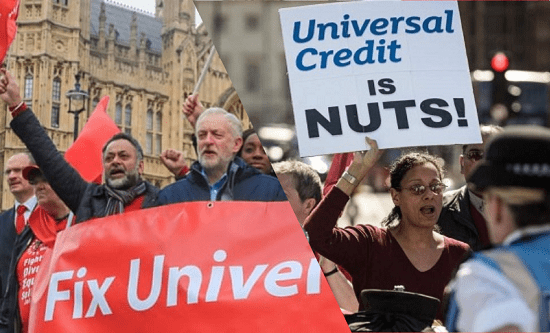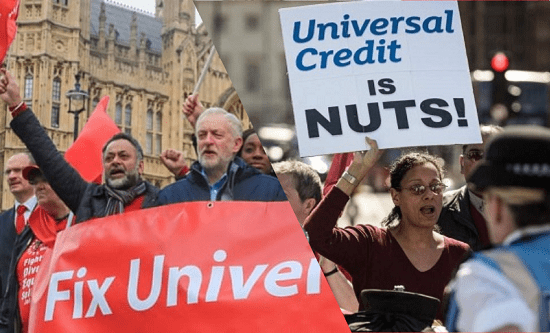
On 5 November 2018, Esther McVey (then Secretary of State for Work and Pensions) announced a swathe of amendments to Universal Credit (UC). UC is the government’s flagship welfare reform programme, and is a mechanism to slash benefits by the back door. The amendments, which will only affect those already on pre-existing benefits who are expected to ‘migrate’ to UC, include:
- a two-week extension of old-style benefits after UC has been applied for (theoretically cutting waiting times between payments);
- a three-month ‘grace period’ between being notified that you have to apply for UC and your old benefits being stopped;
- a reduction in the rate at which emergency loans for people between payments can be clawed back, and a longer period in which to pay back debt to the Department for Work and Pensions (DWP);
- the extension of two programmes which allow self-employed workers to earn over the minimum wage without their benefits being cut.
These reforms are touted as costing £1bn over five years and are separate from the £1.7bn ‘work allowances’ (increases in the amount one can earn before one’s benefits are removed) promised by Philip Hammond in his Autumn Budget. All in all, ten-figure investments into administering UC have been made by Hammond’s Treasury twice in as many years, with the cost of easing its roll-out estimated at £4.2bn since November 2017.
Universal Contempt
UC has been deeply unpopular since its proposal. Vaunted initially as a way to make the benefits system easier to navigate by rolling six separately-claimed benefits into one, the policy has been subject to cock-up after cock-up in the form of missed or botched payments to claimants, unmanageable periods between applying for the benefit and receiving the first payment, and a failure to ensure an accessible way for claimants to inform the DWP of changes in their circumstances or to query and correct false information that affects their payment. These factors have exponentially increased the use of food banks in Britain, and there is evidence to suggest that they have contributed to higher levels of both debt and domestic violence (see FRFI 243 and FRFI 261). These claims were verified by Philip Alston, the UN Special Rapporteur for Extreme Poverty, who reported that charitable efforts to prevent social catastrophe in areas where UC is rolled out ‘resembled the sort of thing you’d see after a natural disaster’ (The Guardian 16 November 2018). While estimates in The Independent (5 November 2018) claim that the new measures will make UC less painful for some 2.8 million people in future, McVey’s announcement does not apply to those claiming UC as their first benefit, nor to those who ‘migrate’ to UC due to a change in their circumstances rather than to the government’s planned phase out of their current benefit. As such, the effect of these amendments on young people, women, and those who are forced out of work will be negligible.
Housing and disability charities, churches, trade unions and the Local Government Association have all attacked UC on the basis of its technical failures, all to little avail; with Alston reporting that relevant ministers remained blasé about UC’s problems. The pressure mounting from within the Tory Party’s social base and establishment over the past weeks has been decisive in forcing recent changes. Member surveys by the Residential Landlords Association (RLA), a lobbying group for private landlords, found 61% of their tenants who claimed UC were in rent arrears, with the average amount owed increasing by 49% in the last year alone (The Telegraph 28 October 2018), and with former Tory Prime Minister John Major warning that continuing to implement UC without amendment could take the government ‘down the same road…as the poll tax’ – a policy which led to rioting in the streets of Britain’s major cities in the 1980s. In early October, rumours began to circulate that up to 30 Tory MPs (more than double the party’s majority) were willing to defy the party whip and vote against the budget if changes were not made to UC’s roll-out. This would have unquestionably toppled May’s government.
Labour misses open goal
These developments dwarf any exertions of the Labour Party which, finding itself in front of an empty net, promptly fell over its own feet. Labour has openly supported the ‘principle’ of UC since its proposal, and only initially quibbled about the Tories’ competence in implementing it efficiently. Despite the near universal contempt with which UC is viewed, Labour has not retreated from its support for the policy and insisted that a ‘pause and fix’ was all that was required to make UC’s roll-out workable.
This, eventually, brought Labour into conflict with the broader labour and anti-austerity movements, with the TUC voting at its September conference to call on Labour to commit to scrapping UC if it came in to power. In response to these calls, Shadow Work and Pensions Secretary Margaret Greenwood committed instead to a lengthy ‘review’ of welfare policy; ignoring that a similarly extensive fact finding ‘roadshow’ amongst disabled people had concluded only a year before. This was, correctly, taken as an insult and a sign of Labour’s impotence by disabled campaigners. Paula Peters of Disabled People Against Cuts (DPAC) told the Disability News Service:
‘We have sat down at so many round table events and talked and talked to Labour…We don’t want talk from Labour, we want action. We’re fed up of meetings and talking with little [coming] from it’ (28 September 2018).
Nor was Peters reticent about the fact that Labour cannot take the disabled people’s movement for granted:
‘We will take the fight to them if need be. The anger is building and it’s palpable…The mantra “for the many, not the few” is starting to ring a bit hollow’.
Following the Labour conference the party’s stance on UC became even more erratic and bizarre. Aware of how unclear and unattractive his party’s line is, Shadow Chancellor John McDonnell insisted that the ‘government’s or other proposals [could not] reform [UC] … it’s a shambles and it’s iniquitous’ (The Observer 7 October 2018). This univocal change to Labour policy was allowed to stand for a whole week before correction by Shami Chakrabarti, the Shadow Attorney General. McDonnell’s flagrant contradiction of the ‘pause and fix’ policy was, Chakrabarti assured us, not ‘a change of policy’ at all, but ‘dramatic language’ which merely sounds like a change of policy (The Independent 14 October 2018).
Labour is unsure of whether it supports UC or not, despite the policy’s unpopularity with unions, campaigners, and voters. Labour is a capitalist party in a period of capitalist crisis. Even if ‘fixing’ the most egregious aspects of UC’s roll-out is possible, the policy itself would still involve bringing part-time workers into the same disciplinary apparatus as the unemployed; subject to cuts to their payments if they are not deemed to be trying hard enough to look for extra hours. For the British ruling class UC is an attractive way of preventing labour costs from rising while freeing some profit from being appropriated for welfare spending. To remain a party of capital, Labour will need to commit itself to a variant of austerity; its floundering on the question of UC is merely a sign that it doesn’t yet know which variant it would choose if it got into power.
Luke Meehan
Fight Racism! Fight Imperialism! No 267, December 2018/January 2019




